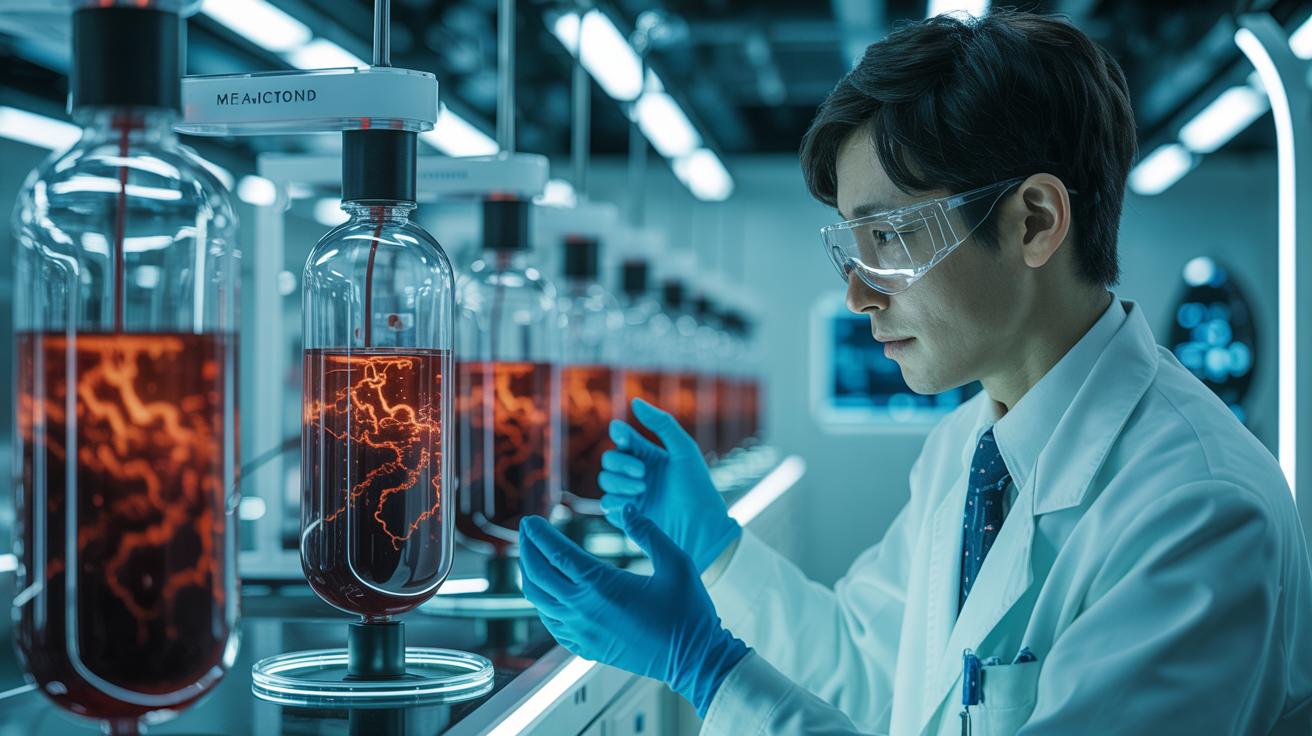What You Need to Know
- 🩸 Universal Compatibility: The artificial blood developed by Japanese scientists can be used in patients of any blood type, eliminating the need for compatibility testing.
- ⏳ Extended Shelf Life: The synthetic blood can be stored for up to two years at room temperature and up to five years under refrigeration, far exceeding the 42-day limit of traditional blood.
- 🔬 Innovative Development: Created by encasing hemoglobin from expired donor blood in a protective shell, the artificial red blood cells are stable and virus-free.
- 👥 Successful Trials: Initial trials with healthy volunteers show promising results, with no significant side effects, paving the way for expanded testing and potential practical use by 2030.
- 🌍 Global Impact: This breakthrough has the potential to alleviate blood shortages worldwide, offering a sustainable and reliable alternative to donated blood, especially in low-resource settings.
In an era where the demand for blood transfusions consistently outweighs supply, particularly in low- and middle-income countries, the development of artificial blood marks a significant breakthrough in medical science. A team of Japanese scientists has pioneered an innovative solution that promises to revolutionize how we approach blood transfusions and critical care. This new artificial blood is not only universal—eliminating the need for compatibility testing—but also boasts a substantially longer shelf life than traditional donated blood. As the world grapples with blood shortages, could this groundbreaking discovery be the key to saving countless lives?
The Science Behind Artificial Blood
The creation of artificial blood involves a meticulous process that begins with the extraction of hemoglobin from expired donor blood. Hemoglobin, a protein containing iron, plays a crucial role in transporting oxygen within red blood cells. Once extracted, it is encased in a protective shell to form stable, virus-free artificial red blood cells. This process not only ensures the artificial blood is free from viruses but also allows it to be stored at room temperature for up to two years and up to five years under refrigeration. This represents a dramatic improvement over traditional blood, which has a maximum refrigeration shelf life of just 42 days.
The innovation lies in the fact that these artificial red blood cells are blood type agnostic. This means that they can be used in patients of any blood type, eliminating the extensive and time-consuming compatibility testing currently required. The implications are enormous, especially in emergency situations where time is of the essence, and in regions where specific blood types are in short supply. By providing a stable and long-lasting alternative, Japanese researchers are paving the way for a new era in transfusion medicine.
Early Trials and Promising Results
Initial trials of this artificial blood began in 2022, involving small groups of healthy male volunteers aged 20 to 50. Participants received intravenous injections of hemoglobin vesicles, which are artificial oxygen carriers designed to mimic the structure of natural red blood cells. The trials, which incrementally increased the volume of artificial blood administered up to 100 milliliters, reported only mild side effects among participants. Importantly, no significant changes in vital signs, including blood pressure, were observed.
Building on these promising results, the research team led by Hiromi Sakai at Nara Medical University has accelerated the development process. In March, the trials expanded to administer between 100 and 400 milliliters of the artificial blood solution to volunteers. If no severe side effects are confirmed, the team plans to transition to testing the treatment’s efficacy and safety in a wider context. This progression highlights the potential for artificial blood to not only supplement but potentially replace traditional blood transfusions in the future.
Comparative Advantages Over Donor Blood
One of the most striking advantages of artificial blood over traditional donor blood is its extended shelf life. As mentioned, the artificial blood can be stored at room temperature for up to two years and refrigerated for up to five years. This is a stark contrast to the typical 42-day shelf life of donated blood under refrigeration, providing healthcare systems with a more reliable and versatile resource.
Furthermore, the universal application of artificial blood eliminates the logistical challenges associated with blood type compatibility. This aspect is particularly beneficial in emergency medical situations and in areas with limited access to diverse blood supplies. The stability and virus-free nature of the artificial blood also reduce the risk of transfusion-related infections, ensuring a higher safety standard for patients. As the trials progress and more data becomes available, the potential for artificial blood to transform the landscape of medical care becomes increasingly apparent.
Future Implications and Global Impact
The successful implementation of artificial blood could have profound implications for healthcare systems worldwide. As the trials continue, researchers are optimistic that this innovation will not only meet the current demand for blood transfusions but also exceed it, providing a sustainable solution to the ongoing blood shortage crisis. The ability to store and transport blood more efficiently could greatly benefit remote areas and regions affected by natural disasters or conflict.
Moreover, artificial blood could play a pivotal role in advancing medical research and treatment for conditions like hemorrhage and stroke. With researchers such as Professor Teruyuki Komatsu exploring supplementary technologies, the future of artificial blood appears promising. As we stand on the brink of a new era in transfusion medicine, the question remains: How will the global medical community adapt to and integrate this groundbreaking technology into everyday healthcare practices?
Did you like it?4.5/5 (28)







12 comments
calebcelestia
How soon before this is available for everyday use? My family could really benefit from something like this!
smokey
I hope this means fewer blood shortages in hospitals. Kudos to the Japanese scientists for this breakthrough!
addisonempress
Is it just me or does this sound like the beginning of a zombie apocalypse? 🧟♂️ Just kidding, amazing innovation!
milo1
Wow, universal compatibility! This could really change emergency care. Kudos to the team behind this!
sebastianoasis
So, does this mean vampires will be out of a job soon? 🧛♂️
Adeline
Can someone explain how they keep the artificial blood virus-free? Sounds like magic to me!
OliveFrost
The future is here! Just imagine the implications for war zones and disaster areas. Amazing work, Japan!
Owen
Great news! But I hope this doesn’t mean we stop encouraging people to donate blood. We still need donors, right?
morgan6
I wonder how this will impact the cost of blood transfusions globally. Will it make them more affordable?
AudreyCelestial
Thank you, Japanese scientists, for this incredible breakthrough! You’re changing the world one discovery at a time.
John
Does this mean blood donations might become history? What’s next, artificial platelets? 🤔
joshua
Wow! This is like something out of a sci-fi movie! Can’t wait to see it in action! 😊